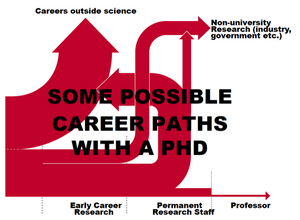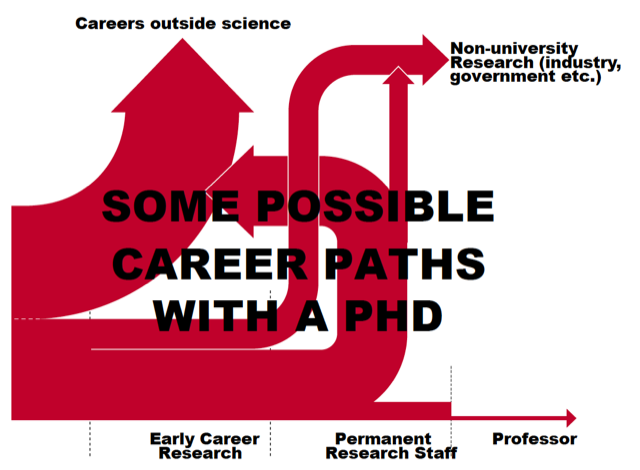 What career path after my doctorate?
What career path after my doctorate?
Did you know that in Switzerland only 33% of PhD graduates embark on an academic career after completing their thesis? According to a study by the Federal Statistical Office (FSO) published in 20181, more than 58% of young PhDs in Switzerland are working in another field one year after the end of their thesis. The doctorate is therefore not only the first step for any academic career, but often represents the first stage for plenty of professions.
Regardless of the path you wish to take, it is important not to wait until the end of your thesis (1) to think about what to do next in your career, (2) to build up a solid set of skills and (3) to have your own network.

1. Thinking about your career path
It is fundamental that you ask yourself, and from the very the beginning of your thesis, what kind of life you aim for, both professionally and personally. This is usually a process that requires time, openness and flexibility. The majority of doctoral students do not know exactly what they would like to do after the PhD, and very few of them do exactly what they had planned!
Ask yourself what is important: is it the working atmosphere? the flexibility? Or perhaps your ethical principles? Do you wish to go on with your professional and personal development or not? And how about the appropriate use of your professional qualifications? Find out about different career paths on the horizon, for example from your former colleagues or from your universities career centres.
2. Building a solid foundation of skills
You have a career plan (perhaps with a Plan B, or even a Plan C), or an idea of possible career options. Learning about the skills and the practical experience you need to acquire or develop is key to maximizing your chances of gaining access to them. Specific and methodological knowledge is more important within the academic labour market than in the non-academic one. Transversal skills such as communication, planning and organisation…, or social skills (empathy, patience, trust, just to name a few) are not just in high demand in the non-academic sector, but also help doctoral students who are aiming for an academic career. For some companies, young PhDs can be relatively expensive, or they may lack practical experience, or be far too specialized. To make a difference, think of all the transferable skills you have acquired during your PhD (and there are more of them than you think), list them and put them forward! Take a look at the activities in the Professional Planning module of the CUSO transversal program that may help you with this particular topic. Keep in mind that the CUSO Transversal Program offers nearly 100 activities per year dedicated to transferable skills.
3. Develop your own network
A former colleague of mine used to say she got all her jobs thanks to the coffee breaks she took and shared. While her skills and experience have certainly played the most effective part in getting jobs, I think she was right: networking is essential. Therefore, do not neglect coffee breaks with colleagues: they help you maintain a mental well-being during your thesis, and they are also moments of exchange and professional sharing. Take advantage of your thesis period to make as many professional contacts as possible, with your former colleagues, friends or experts at conferences for example. Disseminate your research and don't hesitate to ask to meet speakers or PhD students online in this upcoming and weeks. And last but not least : what about to create/implement your LinkedIn profil?
If you have any other ideas or comments on this topic, we would love to hear from you!
1. One year after the end of the thesis, 33% of doctoral graduates are in the academic stream. On the contrary, 67% of doctoral graduates are working in another professional field (58%), are unemployed (4%) or without activity (5%) one year after graduation. Data from "Facilitateurs et entraves à la carrière académique des docteurs diplômés en 2012", Office fédéral de la statistique, 2018




 Version française
Version française